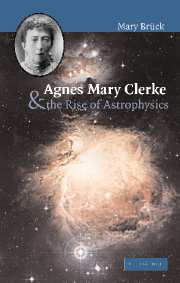Book contents
- Frontmatter
- Contents
- Acknowledgements
- Introduction
- 1 Family background in County Cork
- 2 Ireland and Italy
- 3 London, the literary scene
- 4 The History of Astronomy
- 5 A circle of astronomers
- 6 A visit to South Africa
- 7 The System of the Stars
- 8 Social life in scientific circles
- 9 Homer, the Herschels and a revised History
- 10 The opinion moulder
- 11 Popularisation, cryogenics and evolution
- 12 Problems in Astrophysics
- 13 Women in astronomy in Britain in Agnes Clerke's time
- 14 Revised System of the Stars
- 15 Cosmogonies, cosmology and Nature's spiritual clues
- 16 Last days and retrospect
- 17 Epilogue
- Notes
- Appendix
- Bibliography
- Index
11 - Popularisation, cryogenics and evolution
Published online by Cambridge University Press: 14 August 2009
- Frontmatter
- Contents
- Acknowledgements
- Introduction
- 1 Family background in County Cork
- 2 Ireland and Italy
- 3 London, the literary scene
- 4 The History of Astronomy
- 5 A circle of astronomers
- 6 A visit to South Africa
- 7 The System of the Stars
- 8 Social life in scientific circles
- 9 Homer, the Herschels and a revised History
- 10 The opinion moulder
- 11 Popularisation, cryogenics and evolution
- 12 Problems in Astrophysics
- 13 Women in astronomy in Britain in Agnes Clerke's time
- 14 Revised System of the Stars
- 15 Cosmogonies, cosmology and Nature's spiritual clues
- 16 Last days and retrospect
- 17 Epilogue
- Notes
- Appendix
- Bibliography
- Index
Summary
Astronomy 1898
Among Agnes Clerke's activities during the last years of the century was the part authorship of a book entitled simply Astronomy, one of the Concise Knowledge Library series. Her co-authors were the astronomical spectroscopist Alfred Fowler, Director of the Astrophysical Laboratory at the Royal College of Science in London, whom she knew of old through Lockyer, and John Ellard Gore, a well-known Irish amateur astronomer. This book was Agnes Clerke's single excursion into ‘ordinary’ popular writing. Her contribution comprised the sections on the history of astronomy and the solar system. The reviewer in Nature wondered why ‘such a formidable array of authors’ was needed when any one of the three could have written it alone. There was needless repetition and nothing for ‘the serious student’ that was not already available in Ball's popular books. One assumes that the publisher wanted top names and that the authors dashed off their contributions without much consultation.
Robert Stawell Ball and Gore were the leading popularisers of astronomy in the English language at that period, the successors of Richard Proctor, who died in 1888. Writing and lecturing had been Proctor's only source of income. Ball's circum stances were entirely different. He held chairs of Astronomy first at Trinity College Dublin and then at Cambridge. He was a classical astronomer and a first-rate mathematician whose contributions to science were his books on mechanics and his university textbook on spherical astronomy.
- Type
- Chapter
- Information
- Agnes Mary Clerke and the Rise of Astrophysics , pp. 148 - 160Publisher: Cambridge University PressPrint publication year: 2002



